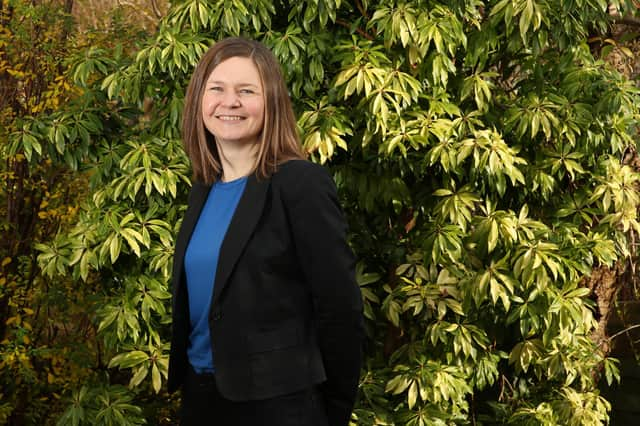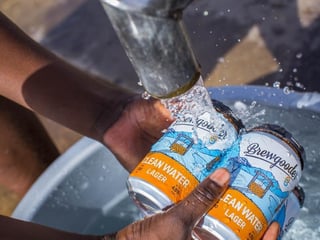The Big Interview: Jill Arnold, head of SIS Ventures


The Edinburgh-headquartered organisation was set up by Social Investment Scotland as the first impact investor north of the Border, launching in 2017. SIS Ventures has already raised and deployed its first fund, Impact First, investing £1.3 million in a selection of high-growth enterprises with an ambition to make a difference.
The businesswoman joined SIS Ventures from Royal Bank of Scotland (RBS) where she led the enterprise strand of the bank’s purpose-led strategy. Her current role sees her take charge of the investor’s existing portfolio and help to lead the next phase of fundraising to support the market for purpose-based business in Scotland. When her appointment was announced she said she was “hugely encouraged” by a new wave of business keen to benefit society – but said such enterprises need access to an adequate supply of capital.
Advertisement
Hide AdAdvertisement
Hide AdWhat do you aim to achieve in your new role at SIS Ventures? Your arrival was billed as coming at a “crucial time” for the organisation.
I’ve only been in post now for a few months, but this really does feel like a pivotal moment for both SIS Ventures and the impact investment market. When SIS Ventures was launched a few years back, impact investment as a category was still very much on the fringes.
However, the onset of Covid-19 has shone a light on the need for business to help address society’s biggest challenges and act responsibly by looking after people and planet as well as profit. Operating within this new economic reality, SIS Ventures now has an opportunity to take a leading role in both supporting innovative mission-driven business ideas and attracting the capital to be able to make a real difference.
We have now deployed all of the initial £1.3m that we raised for our inaugural Impact First fund. So our next move is to raise further capital so we can grow and support more mission-driven businesses and drive greater impact across Scotland and the rest of the UK. Over the coming year, we’re aiming to grow the investment management team, kick-start the second round of fundraising, and support the growth and development of our portfolio of investees.
Advertisement
Hide AdAdvertisement
Hide AdLonger term, while our focus will remain on Scotland, I also believe we’ve got an opportunity to cast our eye further afield and support more mission-driven businesses across the UK, particularly those with disruptive tech and global potential. A key part of our own growth as an impact investor will involve how we measure and report on the overall impact of our funds under management, which in turn will help us open the door to a wider pool of investors.
Can you summarise your career leading up to this, for example you were previously enterprise purpose lead at RBS…
I’ve had a career of two halves in many respects. The first gave me a traditional grounding in finance and accounting, and the second has allowed me to pursue my passion for enterprise, underpinned by those solid financial foundations.
On leaving university, my first job was with Arthur Andersen, formerly one of the UK’s big five accounting firms, where I trained to become a chartered accountant. Soon after qualifying, I took on a project finance role with Grant Thornton before moving to RBS in 2006, where I spent the last 14 years of my career.
Advertisement
Hide AdAdvertisement
Hide AdThis was the job that really fuelled my passion for working with purpose-led businesses. I spent the first years transacting deals in the mid-market private equity space before being given the opportunity to help shape and deliver a number of programmes aimed at nurturing enterprise across the UK.
Most recently, I led the enterprise strand of the bank’s 2023 purpose-led strategy, which committed to helping create 50,000 businesses across the UK by inspiring and supporting more than 500,000 people to consider entrepreneurship as a career. Working with such a diverse range of inspiring entrepreneurs opened my eyes to the wealth of business ideas springing up in communities across the UK – those with the power to make a difference and benefit peoples’ lives.
To what extent has the pandemic accelerated the growing market for mission-driven business?
The devastation wrought by the pandemic has been felt across societies and economies worldwide and, in many cases, has widened the gulf between the haves and have-nots. The only way we can rebuild those economies and protect those societies is if the business community plays its part in the recovery process.
Advertisement
Hide AdAdvertisement
Hide AdAnd just as business will need to shoulder more of the responsibility as we strive to recover, I truly believe that the pandemic has now laid a platform for mission-driven business to play a much more central role in rebuilding a more inclusive economy. A changing mindset among consumers has also helped to accelerate the growth of the market, with an increased preference for buying local and from brands that demonstrate responsible behaviours.
Investors too are increasingly seeing the value of such businesses whose long-term outlooks, rather than short-term shareholder focus, make them more resilient during times of crisis.
Here in Scotland, we are fortunate to have some really exciting young businesses and entrepreneurs, bringing with them a new way of thinking about economic growth and success. The investment community now needs to get behind and nurture these businesses, ensuring that they are central to how we think about building and growing a more sustainable economy in a post Covid-19 world.
You have been involved in many initiatives to encourage those under-represented in entrepreneurship (including women) to consider such a path – can you explain more about this?
Advertisement
Hide AdAdvertisement
Hide AdI’m passionate about supporting everyone to start and grow a business irrespective of their background, age, gender and ethnicity. I believe everyone deserves an opportunity to follow their dream. While at RBS/NatWest Group, I developed and ran several initiatives to help break down the additional barriers some people face to starting up in business.
During my time with the bank, I led its enterprise programme delivery and developed and launched Back Her Business, the UK’s first female-only crowdfunding programme that supports would-be entrepreneurs. Prior to that, I led the delivery of the bank’s £10m Skills & Opportunities Fund, which helped people in disadvantaged communities assist themselves to start up in business.
I also led the bank’s partnership with The Prince’s Trust, helping young people from disadvantaged backgrounds explore starting up in business, which included developing a £5m Enterprise Relief Fund to support young entrepreneurs during Covid-19.
Can you highlight the work of some of the companies in your existing portfolio, and what will you look for when selecting potential portfolio firms?
Advertisement
Hide AdAdvertisement
Hide AdTo date, SIS Ventures has invested £1.3m in eight high-growth enterprises, all of them bound by a common purpose to make a positive difference to society and/or the environment. That portfolio includes Talking Medicines, ClinSpec DX, Enterobiotix, Trojan Energy, Cyan Forensics, Good-Loop and Brewgooder.
Our investments in Trojan Energy and Clinspec DX were completed this year, and they are both great examples of the types of business we like to invest in at SIS Ventures. Mission-driven, early-stage, disruptive, based on innovative tech and with ambitious management teams who are laser-focused on scaling up their businesses while maximising their impact.
Trojan Energy, for example, was formed with one key mission: to ensure everyone benefits from the energy transition. With a strong focus on enabling the uptake of renewable energy, it developed the Trojan EV Charging System. This system deploys a lance technology that can be removed when not in use, benefiting vehicle owners without driveways, as well as pedestrians and councils. Leaving the pavements clutter-free for everyone gives electric vehicle owners the confidence and practicality of having their own personal “charging unit”.
Some of the most exciting young businesses emerging within Scotland and the UK at the moment are in the healthtech space. In August, we participated in ClinSpec Dx’s pre-Series A investment round. ClinSpec Dx is focused on commercialising an exciting new technology that could revolutionise cancer diagnostics – a spectroscopic liquid biopsy with artificial intelligence for the detection of cancer and other diseases.
Advertisement
Hide AdAdvertisement
Hide AdClinSpec Dx’s patented Drop, Dry, Detect system is low-cost, high-throughput and non-invasive. The ambition is for a multi-cancer diagnostics platform as a rapid triage tool that will lead to earlier diagnosis and significantly improve patient outcomes.
While these two enterprises operate in different fields, they share a common impact-based view of the world, and the potential to make a real difference to society or the environment. That’s one of several things we look for when selecting potential investments. Impact must also be a critical component of their DNA – delivered through a core product or service with a definable beneficiary group.
That’s why we put in place a mission lock within the company’s articles; it ensures that social or environmental impact is locked into the business strategy. We also look for strong principled business leaders who can demonstrate a clear commitment to implementing environmental, social, and governance best practice.
While we’re keen to support mission-driven businesses with impact across the UK and further afield, the businesses we support must be either headquartered in Scotland or with a significant impact in Scotland. Finally, our sweet spot is identifying firms with a low capital intensity allowing us to make a meaningful participation by investing between £100,000 and £500,000, and as close to revenue-making as possible.
Who do you admire in business?
Advertisement
Hide AdAdvertisement
Hide AdWhile it might not be fashionable to admire bankers these days, I have a lot of admiration for the value Ross McEwan delivered during his tenure as CEO of RBS. Not only was he successful in delivering one of the biggest UK corporate turnarounds in history, but he was an amazing people leader. He was authentic and consistent, which built trust and loyalty.
He was highly visible both within and outside the bank and he had no airs and graces, treating everyone with respect. I would often see him sitting on “the street” at Gogarburn having one-to-ones with his executive team and he was always eager and interested to hear what his colleagues were up to when we bumped into him in the coffee queue!
What would you like SIS Ventures to look like in two years’ time?
I’d like SIS Ventures to be a recognised brand within the venture capital market with a reputation for being a valuable co-investor with an unrivalled expertise in impact. Improving our standing in the market will also allow us to become thought leaders, shaping and influencing business and investor opinion on the subject of impact investment.
Advertisement
Hide AdAdvertisement
Hide AdHopefully we’ll have grown our funds under management to around £10m, looked after by a first-class team of fund managers. Finally, and in line with the overall mission of Social Investment Scotland, I’d like us to have made a real, measurable and sustainable impact on peoples’ lives, reported using an internationally recognised impact framework, and played an active role in helping Scotland rebuild its economy back better and stronger.
A message from the Editor:
Thank you for reading this article. We're more reliant on your support than ever as the shift in consumer habits brought about by coronavirus impacts our advertisers.
If you haven't already, please consider supporting our trusted, fact-checked journalism by taking out a digital subscription.
Comment Guidelines
National World encourages reader discussion on our stories. User feedback, insights and back-and-forth exchanges add a rich layer of context to reporting. Please review our Community Guidelines before commenting.
